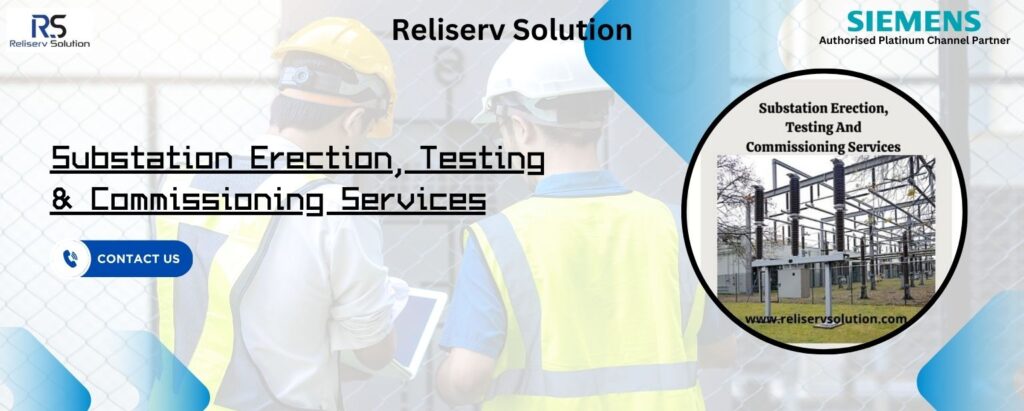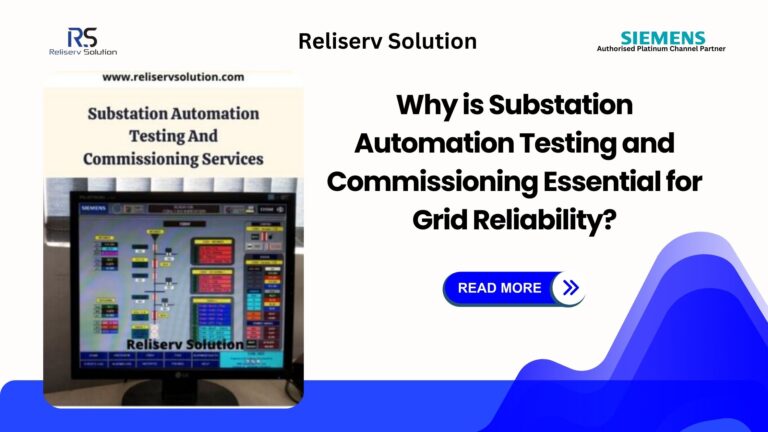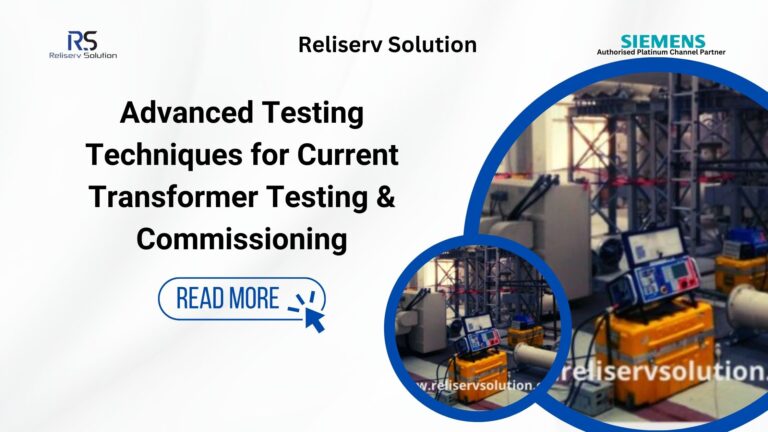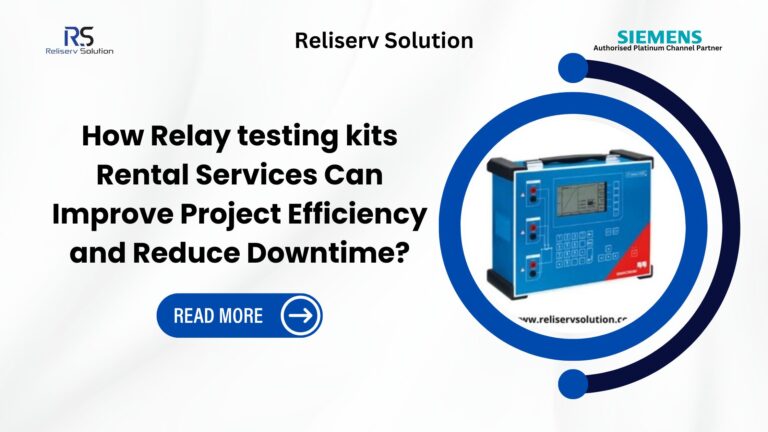An Overview: Substation Erection, Testing, And Commissioning Services
Understanding the complexities involved in substation erection, testing, and commissioning is essential for professionals in the power industry, as well as for stakeholders who depend on reliable power supply. This blog not only aims to provide a comprehensive overview of these processes, but also highlighting their importance, the steps involved, and the benefits they offer in enhancing the performance and reliability of power systems.
Substation Erection:
- Planning and Design: The erection of a substation begins with meticulous planning and design. This phase involves:
-
-
- Site Selection: Identifying a suitable location based on factors such as proximity to load centers, accessibility, environmental impact, and regulatory compliance.
- Engineering Design: Developing detailed blueprints and specifications for the Substation Erection Services in India, including electrical schematics, layout plans, and mechanical designs. This stage also involves selecting appropriate equipment and materials.
- Permitting and Approvals: Obtaining necessary permits and approvals from regulatory authorities and stakeholders.
-
- Construction and Installation: Once the planning and design phase is complete, the actual construction and installation process begins. Key activities include:
-
- Civil Works: Constructing the foundation, buildings, and other structural components of the substation. Moreover, This includes site preparation, excavation, concrete work, and the construction of control rooms and switchgear buildings.
- Equipment Installation: Installing major electrical components such as transformers, circuit breakers, switchgear, busbars, and protective relays. This step also involves laying cables and erecting support structures like towers and gantries.
- Auxiliary Systems: Setting up auxiliary systems such as communication networks, SCADA (Supervisory Control and Data Acquisition) systems, and emergency power supplies.
Testing:
- Pre-Commissioning Tests: Before a substation can be fully commissioned, it undergoes a series of pre-commissioning tests to verify the correct installation and functionality of its components. These tests include:
- Insulation Resistance Testing: Measuring the insulation resistance of electrical components to ensure there are no faults or potential breakdowns.
- Dielectric Testing: Applying high voltage to components to test their insulation strength and ability to withstand operational voltages.
- Functional Testing: Verifying the correct operation of individual components such as transformers, circuit breakers, and relays.
- System Integration Tests: System integration tests are conducted to ensure that all components work together seamlessly as an integrated system. These tests include:
- Protection System Testing: Verifying that protective relays and circuit breakers operate correctly and coordinate effectively to isolate faults and protect equipment.
- Control System Testing: Ensuring that control systems, including SCADA, function correctly and allow for effective monitoring and control of the substation.

Commissioning:
- Final Commissioning Tests: The final commissioning phase involves comprehensive testing and verification to ensure the Substation Commissioning in Mumbai is ready for operational service. This phase includes:
- Load Testing: Simulating actual load conditions to verify the performance and stability of the substation under real-world operating conditions for Substation Commissioning in Mumbai.
- Relay Coordination: Fine-tuning the settings of protective relays to ensure optimal coordination and response to faults.
- Handover and Documentation: Once all tests are successfully completed, the Substation Commissioning in Mumbai is handed over to the operational team. This involves:
- Training: Providing training to operational personnel on the operation and maintenance of the substation for Substation Erection Services in India.
- Documentation: Delivering comprehensive documentation, including test reports, as-built drawings, operation manuals, and maintenance schedules.
- Final Inspection and Approval: Conducting a final inspection with regulatory authorities and obtaining formal approval for the Substation Commissioning in Mumbai to enter into Substation Erection Services in India.
Benefits of Substation Erection, Testing, and Commissioning Services
- Ensuring Reliability and Safety: Effective erection, testing, and commissioning services are essential for ensuring the reliability and safety of substations. These processes help identify and rectify potential issues before they can cause operational disruptions or safety hazards. By thoroughly testing and verifying each component and system. These services help ensure that the substation operates as intended, providing reliable power supply and protecting critical infrastructure.
- Enhancing Operational Efficiency: Properly commissioned substations operate more efficiently, reducing losses and improving overall system performance with Substation Erection Services in India. By optimizing the settings and coordination of protective devices. these services help minimize the impact of faults and ensure quick restoration of service. This enhances the overall efficiency and resilience of the power network.
- Compliance with Standards and Regulations: Erection, testing, and commissioning services help ensure that substations comply with all relevant standards and regulations. This is critical for obtaining necessary approvals and avoiding penalties or legal issues in Substation Erection Services in India. Compliance with standards also ensures that the substation meets industry best practices, enhancing its performance and reliability.
- Extending Equipment Lifespan: Thorough testing and commissioning help identify potential issues that could lead to premature equipment failure. By addressing these issues early, these services help extend the lifespan of Substation Erection Services equipment. Consequently, they reduce the need for costly repairs and replacements.
Provides the following Gas & Air Insulated Switchgear Substation Erection, Testing and Commissioning Services
- Base frame supply and installation (channel/ISMC)
- Installing the LV Chamber and Switchgear Panel
- Panel Coupling at the Location
- Filling the SF-6 Gas
- Verifying the Dew Point and Purity of SF6 Gas
- Checking Current Transformer Performance
- Installing Line and Bus Virtual Terminals
- Testing of bus and line voltage transformers
- Timing Test for Circuit Breakers
- Contact Resistance (measured by the mV Drop test)
- Control schematic and interlocking testing
- HV Testing of Cables and GIS
- Termination of Power Cable Single core and three cores
Conclusion
Substation erection, testing, and commissioning are critical processes that ensure the reliability, safety, and efficiency of power systems. Furthermore, these services encompass a wide range of activities, from the initial planning and design to the final testing and commissioning. By ensuring that all components and systems are correctly installed and functioning as intended, these processes play a vital role in maintaining the stability and performance of electrical networks. Additionally, they help identify any potential issues early on, thus minimizing the risk of downtime and ensuring continuous operation.
For professionals in the power industry, understanding the importance of these services and the steps involved is essential for ensuring the successful deployment and operation of substations. Additionally, by investing in comprehensive erection, testing, and commissioning services, organizations can enhance the reliability and efficiency of their power systems. Moreover, this ensures compliance with standards and regulations while extending the lifespan of critical infrastructure.
In an era where reliable and efficient power supply is more important than ever. The role of substation erection services, testing, and commissioning cannot be overstated. These services are essential for building and maintaining the robust power systems needed to support modern society’s growing energy demands.
Reliserv Solution is a Platinum Channel Partner, an Authorised supplier of Substation erection, testing, and commissioning Services. And has its headquarters in Mumbai, Maharashtra. We also provide a variety of specialized services and solutions to panel builders and other industries. If you have any queries or need help, please email us at [email protected] or give us a call at +917506112097. Click here to browse our selection of Services. Over the years, we have provided numerous other services, including the well-known Substation Erection, Testing, and Commissioning Services.



